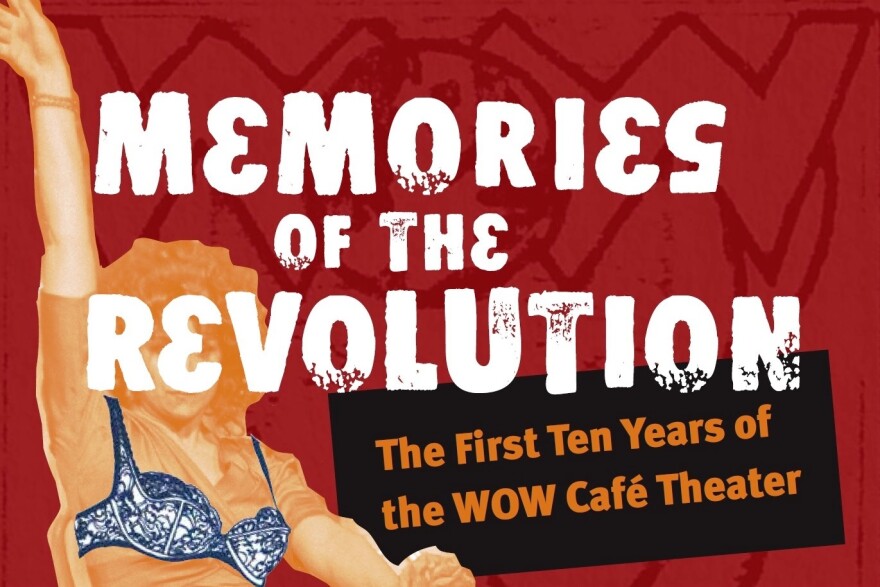Women who performed at the WOW Café Theater on New York City's Lower East Side sometimes called themselves the "Uncooperative Cooperative." Holly Hughes was one of those women. She's said more than once that WOW saved her life.
WOW, or Women’s One World, is a feminist theater space that started in the early 1980's. It was, and still is, a place where many gay women like Hughes found both themselves and their art. WOW became the safe place where they could be who they are without judgment or persecution. At WOW, women who had long felt themselves to be on the margins of society could express themselves as rebels while developing lasting bonds of friendship and support. Their "uncooperative" selves found cooperation in each other.
Hughes is a contributing editor to Memories of the Revolution: The First Ten Years of the WOW Café Theater (co-edited by Carmelita Tropicana and Jill Dolan). The book, published by the University of Michigan Press in 2015, is a collection of memories, play scripts, and photographs of WOW’s first decade.
“I was in New York for a couple of years before I found my way to the WOW Café,” says Hughes. “I saw a poster for a double X-rated Christmas party for women. I thought, 'wow, this looks fun and weird in a good way.' I went to the party and kind of never left.”
What Hughes found was a group of women creating outrageous work for the stage.
“WOW was so warm and welcoming,” she says. “It was my sorority. They were breaking the rules. I was looking for that kind of sense of community. Particularly a feminist sort of community.”
WOW was different than other theater groups in that no play was censored and no auditions were required. Any play got to the stage. Whatever members wrote was performed, no questions asked.
“The idea that was implicit in this was that people get better by doing the work,” Hughes says.
Hughes found that having that kind of acceptance fostered a daring creativity. While she had expected to work back stage, the Café was too small — “I think maybe it was 12 feet across,” Hughes says — to have a back stage. Instead, she found herself performing and writing plays of her own. She found that she liked it.
“When I say now that WOW saved my life — I came of age in a place where I couldn’t access a feminist and LGBT movement. And while I loved K, and I have fond memories of my time there, it was at a time before we had women’s studies, for example. I was really struggling with trying to figure out who I was in the world, and it wasn’t just personal questions about my sexuality. It was larger questions about identity and a larger political landscape, about feminism, and what was then known as the gay liberation movement. WOW helped put my personal struggles into a larger political context. That helped me enormously.”
Before Hughes found her way to WOW, she had attended The New York Feminist Art Institute in 1979. There, Hughes learned about consciousness- raising as an art-making tool. Students sat in circles and talked about their issues, whatever they might be. Women talked about their obsessions about weight and body image. But it was at WOW, Hughes says, that she made the real connection between art and feminism, and art and being gay.
“At WOW, I was able to have conversations with women that didn’t make me feel crazy,” Hughes says. “And this book. Working on this book, I realized a lot of women coming of age at the same time I did, in the 1970's and 80's, the way that they experienced their gender, their sexual identity, was with the feeling that they were crazy. Their sense of injustice in the world seemed like possibly it was a psychological problem. Looking back, I realized how adrift we all felt. But here at WOW we found affirmation.”
Hughes was awarded two Obie Awards, a Guggenheim Fellowship, grants from the National Endowment for the Arts (although one was recalled when her art was discovered to have a gay theme), and others. Her books include Clit Notes: A Sapphic Sampler; O Solo Homo: The New Queer Performance; Animal Acts: Performing Species Today; and Memories of the Revolution: The First Ten Years of the WOW Café Theatre.
Prior to WOW, Hughes studied visual art at Kalamazoo College. “And I took a lot of English. I loved it. I wasn’t an English major, but I was very interested in writing, but still thinking of myself as a visual artist. This was the world of which I wanted to be a part, this was the world that seemed to be my real family.”
Today, as a professor of theater and drama at the Stamps School of Art and Design at the University of Michigan in Ann Arbor, Hughes strives to teach her students to think about the differences in people in a new way. Sharing the manuscript of Memories of the Revolution with students, she found that it drew their interest.
“My career trajectory was not one that would suggest being a professor would be the next logical step,” Hughes smiles. “Nevertheless, here I am. What I try to bring from my early experience in feminist and queer pedagogy — and WOW was a teaching place as well as a performance space — I’m really interested in uncovering what my students want to say. What their desires are, what’s burning and big inside them. I want to help them put that into a larger context.”
Hughes is also a professor of women's studies at the University of Michigan.
Listen to WMUK's Between the Lines every Tuesday at 7:50 a.m., 11:55 a.m., and 4:20 p.m.
You can stay in touch with WMUK news on Facebook , Twitter, and by signing up for our eNewsletter.





